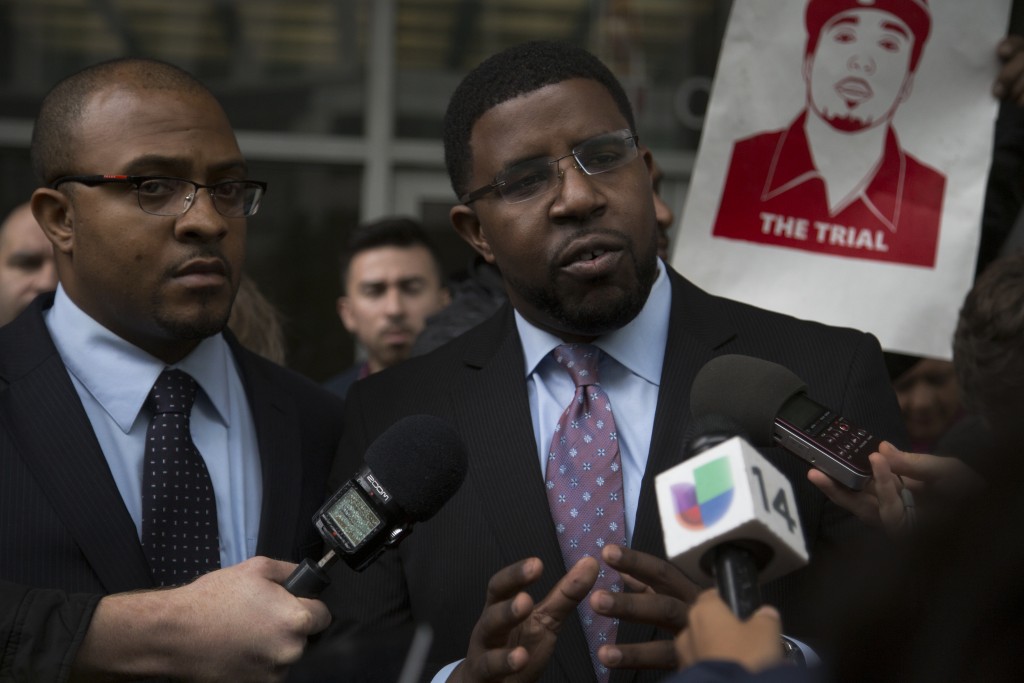Jury Finds No Wrongdoing In Nieto Case

By Marco Siler-Gonzales
The Nieto family will see no reparation, monetary or otherwise, from the City of San Francisco for their son’s killing at the hands of San Francisco police officers.
City College student Alex Nieto was shot and killed in Bernal Heights Park on March 21, 2014 by four officers. After two years of litigation between the Nieto family and the city, a jury has ruled in federal court that the officers were justified in their use of lethal force against Nieto.
A largely white, suburban jury examined 10 days’ worth of evidence and testimonies brought forth by Nieto’s family lawyer and the city’s defense attorney that told two very different versions of what happened.
“What do jurors have to understand that the people they are paying to protect them will and sometimes do violate the laws?”
—Civil Rights Attorney Adante Pointer
The defense, led by deputy city attorney Margaret Baumgartner, argued the officers were within their right to shoot Nieto when he allegedly taunted the officer’s commands to show his hands and proceeded to draw and point his gun at the officers on Bernal Hill. The officers approached Nieto after firing 59 rounds of which at least 10 struck Nieto, and saw that his weapon was a non-lethal Taser.
Civil rights attorney Adante Pointer argued that Nieto’s hands had remained in his pocket during his encounter with the officers, and the officers only yelled, “Stop!” before shooting. Sole witness Antonio Theodore testified that Nieto dropped to his knees with his hands in his pocket after the first volley of bullets were fired, after which he fell face down, hands still in his pocket, as the officers fired more rounds.
The defense made a case to discredit Theodore based on his admittance to alcohol abuse and conflicting answers made in his deposition a year ago.
A bone fragment from Nieto’s wrist that was found inside his jacket pocket indicated his hands were in his pockets during the shooting. Yet, medical examiner Dr. Amy Hart testified during the trial that she could not conclude the bone fragment found in his pocket was a direct cause of his hands being in his pockets at the time of the shooting. No photo of the jacket was shown during the trial.
When asked what it takes to beat the cops in these types of cases, Pointer said it would be a better question for the other side. “What do officers need in order not to engage in this type of conduct? Or, better yet, what do jurors have to understand that the people they are paying to protect them will and sometimes do violate the laws?”
Although the verdict was not in the Nieto family’s favor, Pointer said they remain undeterred because the truth had come out. “Until going through this process, the public did not know what took place,” Pointer said.
Baumgartner remained adamant that Nieto posed a threat by pointing his Taser at the officers.
“It’s tragic to lose a child. I feel for the family, but I think the officer’s did not violate their constitutional right when they used lethal force,” Baumgartner said.
This case reflects a repetitive and perhaps systemic pattern of police using deadly force against black and brown men in San Francisco and across the nation. The Nieto trial has drawn a huge community response, especially following the police shooting of Mario Woods, a black man shot in the Bayview, and Amilcar Perez-Lopez, a Guatemalan immigrant shot in the Mission.
“This only proves again that if you are a white police officer, you have the right to walk free and be happy if you kill a black or brown person in this country,” Ely Flores, a close friend of Alex Nieto, said.
The members of the Justice for Alex Nieto Coalition said they will continue to fight against the injustices that transpire against the members of their community.
“We’re still happy that Alex’s story was told and that everybody knows who he was and who he is,” said Oscar Salenez, a member of the Justice for Alex Nieto Coalition. “The evidence came out and now the public can make a decision for themselves based off the evidence.”
Contact a reporters
Send an email to: Marco Siler-Gonzales or tweet mijo_marco
